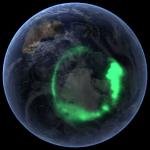World Space Week: 4-10 October 2013
24 September 2013
Joining organisations and enthusiasts worldwide, we’re celebrating the importance of monitoring and predicting space weather this World Space Week.
Extending beyond the troposphere, changes in the upper atmosphere and space—particularly the electrically charged region between the Earth and Sun—can impact on a range of industries from radio communications to emergency services.
The Bureau’s space weather branch, Ionospheric Prediction Service, not only observes and predicts space weather, but also provides access to a variety of warnings and advice on conditions including:
- solar wind speed and solar flares;
- cosmic rays, geomagnetic storms and aurora australis; and
- high frequency radio propagation and polar cap absorption.
Aurora australis from Tasmania, Australia, on 15 July 2012 by Ian Stewart
Why space weather?
Monitoring conditions in space is becoming increasingly important. Changes in space conditions have the potential to cause a range of impacts such as:
- radio performance and power grid blackouts;
- rerouting flights in high latitudes to avoid high radiation levels and difficulties with radio communications;
- severe geomagnetic, ionospheric and radiation storms;
- enhanced corrosion of long distance pipe lines, such as petroleum or gas pipe lines; and
- satellite and space mission malfunctions.
As society becomes more dependent on technology, the more we utilise space—the more we're affected by space weather.
Based on national and international observations, our services and advice provide support for radio communications, energy transfer infrastructure, defence, aviation, maritime, emergency services, mining exploration and public safety.


Comment. Tell us what you think of this article.
Share. Tell others.